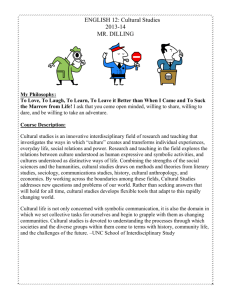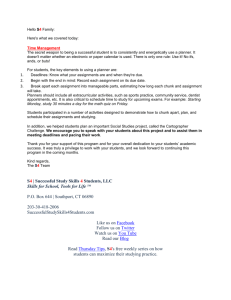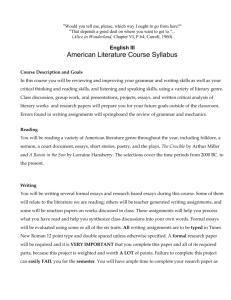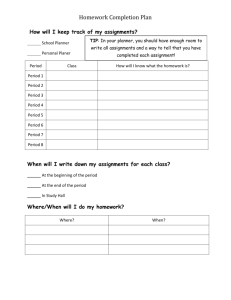Effective Time Management for University Students
advertisement
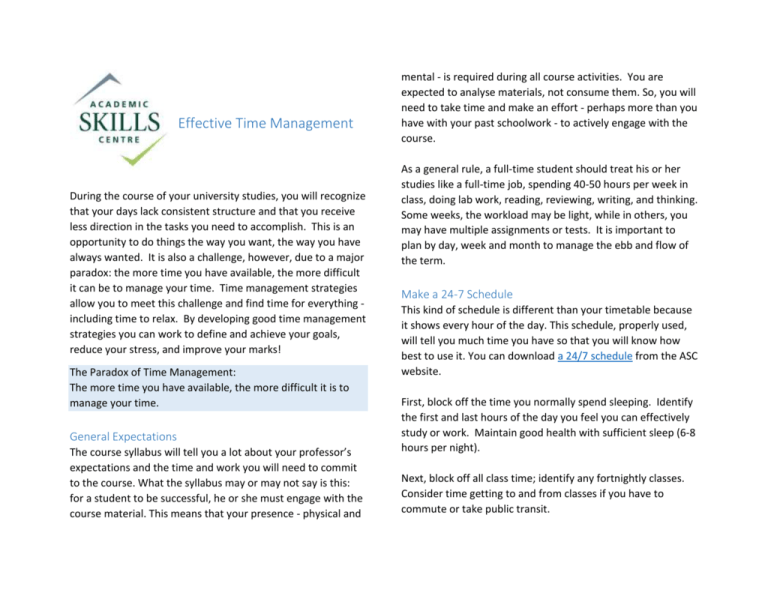
Effective Time Management During the course of your university studies, you will recognize that your days lack consistent structure and that you receive less direction in the tasks you need to accomplish. This is an opportunity to do things the way you want, the way you have always wanted. It is also a challenge, however, due to a major paradox: the more time you have available, the more difficult it can be to manage your time. Time management strategies allow you to meet this challenge and find time for everything including time to relax. By developing good time management strategies you can work to define and achieve your goals, reduce your stress, and improve your marks! The Paradox of Time Management: The more time you have available, the more difficult it is to manage your time. General Expectations The course syllabus will tell you a lot about your professor’s expectations and the time and work you will need to commit to the course. What the syllabus may or may not say is this: for a student to be successful, he or she must engage with the course material. This means that your presence - physical and mental - is required during all course activities. You are expected to analyse materials, not consume them. So, you will need to take time and make an effort - perhaps more than you have with your past schoolwork - to actively engage with the course. As a general rule, a full-time student should treat his or her studies like a full-time job, spending 40-50 hours per week in class, doing lab work, reading, reviewing, writing, and thinking. Some weeks, the workload may be light, while in others, you may have multiple assignments or tests. It is important to plan by day, week and month to manage the ebb and flow of the term. Make a 24-7 Schedule This kind of schedule is different than your timetable because it shows every hour of the day. This schedule, properly used, will tell you much time you have so that you will know how best to use it. You can download a 24/7 schedule from the ASC website. First, block off the time you normally spend sleeping. Identify the first and last hours of the day you feel you can effectively study or work. Maintain good health with sufficient sleep (6-8 hours per night). Next, block off all class time; identify any fortnightly classes. Consider time getting to and from classes if you have to commute or take public transit. Finally, block off all other fixed commitments: work, volunteering, working out, study group, student government/club meetings, regular movie night. If you know you will be spending Friday nights out with friends, block it off – don’t try to plan to do work at a time when it is unlikely to happen. (Also consider how early you will rise the following Saturday.) Evaluate the time remaining and identify blocks of time for regular study and major assignments; approximately 20-25 hours should be available for doing readings, completing weekly assignments, pre-labs, and problem sets, researching and writing reports and essays, and reviewing materials in preparation for tests and examinations. Remember that you have other activities around study that you cannot ignore: eating, laundry, personal care, grocery shopping, and other general tasks. You should still have time available for these activities and general leisure too. You may wish to establish all of these academic and personal activities in specific blocks of time (i.e. laundry on Wednesdays, 4-6pm; reading for Bio on Thursdays 8-10pm). However, this method does not work for everyone. You may find it more useful to know, based on the space available in your 24/7 schedule, that you have 3 hours available on Tuesday afternoons and 4 hours on Tuesday evenings; you can then decide, on a weekly basis, what tasks fit in those time slots (i.e. this week: research for Psychology Tues. aft.; math problem set and bio pre-lab Tues. eve.). This is an easily adaptable approach. Using a Term-at-Glance Calendar Effectively You can download a term-at-a-glance calendar from the ASC website or use a four-month wall calendar, whichever is more convenient for you. The point is, though, to have a calendar that shows all the months of a term, from September to December and from January to April, without turning a page or changing screens. 1. First, enter the due dates for every assignment. 2. Consider the steps required for each assignment (generally: research, outline, draft, edit). You may find the Assignment Analysis Sheet helpful. Enter the start and end dates for each particular step of each assignment, which should help you to see how each week is shaping up in terms of what is due, what needs to be started, and so on. Don't forget to include important events in your personal life on this calendar. These are crucial in giving you an accurate picture of your week and month. 3. Do this as early as you can in the term. Other points to consider: 1. Be flexible. Don't worry if you need to adjust your calendars a few times. That's part of the trial-by-error process, and it's useful. 2. Remember that colour-coding can help you to keep straight which assignments are for which class. 3. When a week is becoming very full, try moving some tasks to earlier slots. That way, you'll be spreading your workload over the entire term. Once again, you need to start early or none of your planning will work as well as it could. Your Daily Planner The final step in your time management process is to record all of the critical information in your daily planner or in daily to-do lists. Referring to your 24/7 schedule to identify blocks of time for school work and using your deadlines and minideadlines to prioritize your work, you can effectively plan your week and your day to keep up with your readings, stay on track with essays and assignments, and maintain your personal interests and social life. Sample To-Do List Make time to manage your time: Plan your week on the same day every week. Tips for Planning Your Work Week 1. Use your time wisely: don't plan to spend too long on one task. Establish a comfortable time span during which you can focus. Take lots of small breaks to reenergize. 2. Vary your tasks: don't spend all night just reading or just writing. Do some research, some thinking, some editing. 3. Plan your tasks so that you blend more enjoyable tasks with less pleasant ones. Don't leave all the things you don't want to do until the end. 4. Consider your habits. If you are not normally at your best first thing in the morning, schedule an activity that is more active or that you are motivated to do (perhaps you enjoy reading for History or writing essays for ERS – do this at times when it might be difficult to convince yourself to tackle readings for Philosophy or Chemistry). 5. Reward yourself for staying on track, but also take time to re-assess if you think things are derailing. The Keys to Successful Time Management Be Honest Forget what you "should" do or what you think others are doing or what you wish you could do; stick to what you actually do. Remember, no one is judging you- this process will work only if you are completely honest with yourself. Everyone approaches time management (and life!) differently, so you are the best judge of how to adapt these strategies to you and your work. Be Realistic Unless you are superhuman, it is best to stick with what you know about yourself. If your approach to these time management tools is unrealistic, you won't use them. Don't try to take on too much, but don't sell yourself short either. Above all, get to know your own capabilities. Build in Personal Time Everyone needs to take care of non-school things too. Be sure to build recreational, social, and personal time into your schedule. Do this first, not as an afterthought. Be Flexible Review your plan constantly; update it often. If you fall behind, don't worry - simply rearrange your schedule. If something unexpected happens, go with it and rearrange your plan later. Remember, you control it; it doesn't control you. Stick with Your Plan The best plan in the world will fail if you don't use it. Get in the habit of using the daily/weekly planner for everything, every day. Be sure to record all of your appointments and activities in the appropriate place. Give it Time If you need to change what you do or how you do it, try to change one thing at a time. Things will get better as you get better. After all, that's why you are at university - to learn. The Academic Skills Centre Trent University www.trentu.ca/academicskills acdskills@trentu.ca 705-748-1720



